Classical musician Itzhak Perlman was introduced Tuesday to his Elon University Fall Convocation audience as a "violin virtuoso" and "a man of great humility." What was to follow over the next hour proved both.
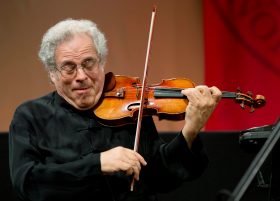
“Fall Convocation: A Conversation with Itzhak Perlman” brought together more than 1,000 members of the campus community with the purpose of celebrating knowledge generated by the arts and sciences. It also offered Perlman, who celebrated his 70th birthday in August, a brief pause from a world tour that takes him across the globe for dozens of performances through May.
“My goal,” he said during his campus visit on Oct. 6, 2015, “is to continue enjoying what I do.” Perlman’s performance onstage of works by Bach, Fritz Kreisler and Henryk Wieniawski demonstrated just how strong that enjoyment is today.
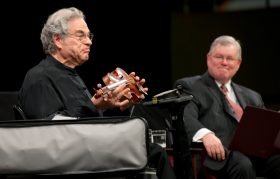
Whittington has appeared as lyric baritone soloist with the company, as well as the Atlanta Choral Guild, Ash Lawn Opera, Charlottesville Oratorio, Raleigh Oratorio and the Choral Society of Durham. As a recitalist, Whittington has premiered works by Frank E. Wiley and Roger Hannay.
His own musical experience, and his understated humor, created a natural chemistry with Perlman that delighted the Alumni Gym crowd.
Perlman opened the program by tracing his passion for music starting at the age of 4. After expressing initial interest in the violin, his parents thought they could recruit a performer from the city’s boardwalk, a man who claimed he could teach. That teacher lasted three lessons.
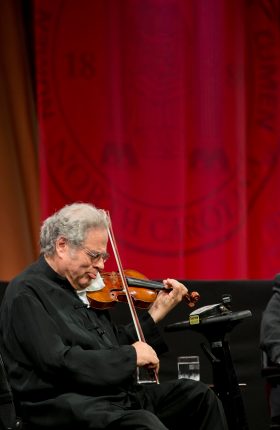 “He was summarily fired, and then they did something a little more systematic,” Perlman said. “They went to the local academy and asked if anyone there was ready to teach ‘our little genius.’”
“He was summarily fired, and then they did something a little more systematic,” Perlman said. “They went to the local academy and asked if anyone there was ready to teach ‘our little genius.’”
His next instructor spent eight years developing his talents until Perlman moved to the United States and his career took off following a 1958 appearance on “The Ed Sullivan Show.” He made his Carnegie Hall debut five years later, and he has since performed with every major orchestra and at venerable concert halls around the globe.
Perlman recounted his involvement in Steven Spielberg’s 1993 Academy Award-winning film “Schindler’s List,” in which Perlman performed the violin for a score by composer John Williams. Williams called Perlman to ask if he would perform, and Perlman wasn’t sure how “somebody who writes the music for ‘E.T.’” could write the score for a film about the Holocaust.
“When I heard the music and saw the score, I realized he was able to get the taste and flavor of the music so perfectly,” said Perlman, noting that Williams used silence in the film to create drama. “Rests are so important in performance. The rest gives you the tension between notes. And the tension between notes is what makes stuff work. If there is no tension between notes, that’s nice, but it doesn’t work.
“The drama is not just where the music is. It’s also where the music is not.”
In addition to his musical appearances, Perlman assists his wife, Toby, with the Perlman Music Program. The program offers unparalleled musical training to young string players through intensive summer programs and mentoring, which means keeping parents at bay from their child prodigies.
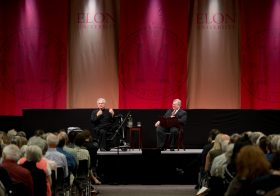 Perlman was adamant that he and his wife do not allow parents to participate in anything the program hosts. Other than the right to weekly visits, the couple doesn’t want parents to place undue pressure on children who may already feel stressed about their natural talents.
Perlman was adamant that he and his wife do not allow parents to participate in anything the program hosts. Other than the right to weekly visits, the couple doesn’t want parents to place undue pressure on children who may already feel stressed about their natural talents.
That extends to the students’ use of cell phones. “They would practice, and they would put their cell phones on the floor while they practiced, so their parents could hear what they were doing,” Perlman said. “As a result, we said no cell phone while you practice. That’s how outrageous it can become!”
Some parents are really nice, Perlman said. Sometimes they’re “even smart” and give their child space to grow and learn. Still, “a lot of parents are not smart about their children. They want great things for their children, but to go about it, sometimes they’re impatient.”
Perlman explained how his concentration, his ability to “appreciate what I’m doing,” helps him maintain his enthusiasm and interest for music after a lifetime of performances. He also noted that his time isn’t spent solely performing music. He conducts, and he teaches.
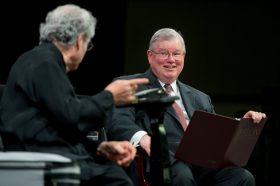 It’s teaching that renews his sense of passion, Perlman said. Helping young musicians develop their own talents offers him a way to assess his own room for improvement. “When I teach others, I teach myself,” Perlman said. “I find I don’t need a middleman to tell me what to do.”
It’s teaching that renews his sense of passion, Perlman said. Helping young musicians develop their own talents offers him a way to assess his own room for improvement. “When I teach others, I teach myself,” Perlman said. “I find I don’t need a middleman to tell me what to do.”
Perlman’s distinguished career includes a Kennedy Center Honor in 2003 from the John F. Kennedy Center for the Performing Arts in celebration of his achievements and contributions to the cultural and educational life of the United States.
In 2009, Perlman took part in the Inauguration of President Barack Obama, premiering a piece written for the occasion by John Williams alongside cellist Yo-Yo Ma, clarinetist Anthony McGill and pianist Gabriela Montero, for an audience of nearly 40 million television viewers in the United States and millions more throughout the world.
A major presence in the performing arts on television, Perlman has received four Emmy Awards, including one for the PBS documentary “Fiddling for the Future,” a film about the Perlman Music Program and his work as a teacher and conductor there.
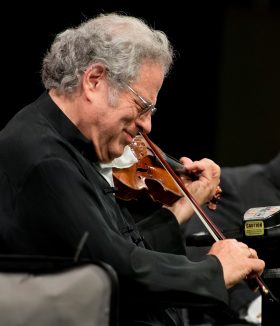 Perlman has entertained and enlightened millions of television viewers of all ages on popular shows including “The Late Show with David Letterman,” “Sesame Street,” “The Frugal Gourmet,” “The Tonight Show” and multiple Grammy Awards telecasts. Having garnered 16 Grammy Awards over the years with his best-selling recordings, Perlman was honored in 2008 with a Grammy Lifetime Achievement Award for excellence in the recording arts.
Perlman has entertained and enlightened millions of television viewers of all ages on popular shows including “The Late Show with David Letterman,” “Sesame Street,” “The Frugal Gourmet,” “The Tonight Show” and multiple Grammy Awards telecasts. Having garnered 16 Grammy Awards over the years with his best-selling recordings, Perlman was honored in 2008 with a Grammy Lifetime Achievement Award for excellence in the recording arts.
Born in Israel in 1945, Perlman completed his initial training at the Academy of Music in Tel Aviv. Harvard, Yale, Brandeis, Roosevelt, Yeshiva and Hebrew universities are among the institutions which have awarded him honorary degrees. President Ronald Reagan honored him with a “Medal of Liberty” in 1986, and in December 2000, President Bill Clinton awarded Perlman the “National Medal of Arts.”


